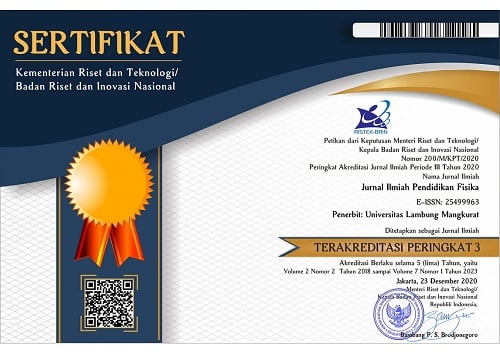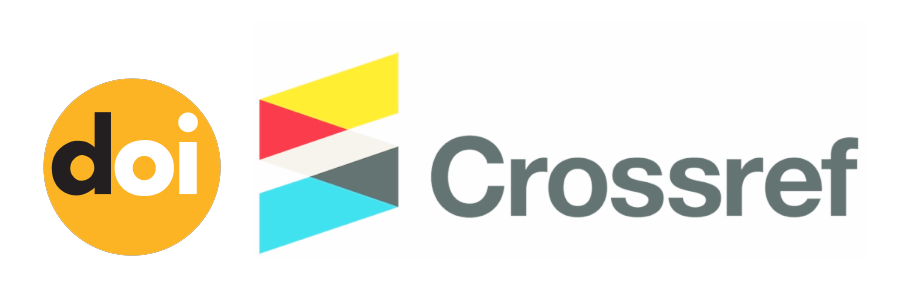Development of Student Worksheets on Dynamic Fluids Material to Enhance Scientific Creativity
Abstract
Scientific creativity involves creating innovative ideas, thoughts, or concepts. Scientific creativity in schools is not sufficiently trained. This study aims to produce valid, practical, and effective dynamic fluids student worksheets that are suitable for enhancing students' scientific creativity. This study applied the ADDIE model with 34 test subjects from the XI MIPA 3 class at SMA Negeri 8 Banjarmasin. Data were obtained from validation sheets, student response questionnaires, and learning outcome tests. The results showed that: (1) The student worksheets is considered valid because the validation results of the student worksheets and learning outcome tests were categorized as very good; (2) The student worksheets is considered practical because the results of the student response questionnaires were categorized as good; (3) The student worksheets is considered effective because the N-Gain of scientific creativity was 0.70, which falls into the high category. The developed dynamic fluids student worksheets is appropriate for enhancing students' scientific creativity in physics learning. Teachers can use this the student worksheets as an alternative to improve students' scientific creativity in physics education efforts.
Keywords
Full Text:
PDFReferences
Abdurakhman, O., & Rusli, R. K. (2015). Teori belajar dan pembelajaran. Didaktika Tauhidi: Jurnal Pendidikan Guru Sekolah Dasar, 2(1).
Aldila, C., Abdurrahman, A., & Sesunan, F. (2017). Pengembangan lkpd berbasis stem untuk menumbuhkan keterampilan berpikir kreatif siswa. Jurnal Pembelajaran Fisika Universitas Lampung, 5(4), 85–95.
Ariani, T., & Yolanda, Y. (2019). Effectiveness of physics teaching material based on contextual static fluid material. Physics Education Journal, 2(2), 70–81. http://jurnal.unipa.ac.id/index.php/kpej
Astutik, S., & Prahani, B. K. (2018). Developing teaching material for physics based on collaborative creativity learning (ccl) model to improve scientific creativity of junior high school students. Jurnal Penelitian Fisika Dan Aplikasinya (JPFA), 8(2), 91. https://doi.org/10.26740/jpfa.v8n2.p91-105
Azizah, M. N. (2022). Integration of critical and creative thinking skills in solving hots questions through the sole model on counting rules. Ideguru: Jurnal Karya Ilmiah Guru, 7(2), 179–187. https://doi.org/10.51169/ideguru.v7i2.352
Effendy, I. (2016). Pengaruh pemberian pre-test dan post-test terhadap hasil belajar mata diklat hdw.dev.100.2.a pada siswa smk negeri 2 lubuk basung. Jurnal Ilmiah Pendidikan, 1(2), 81–88.
Fadhilah, Y., Salim, R. M. A., & Safitri, S. (2022). Teacher efficacy and teacher social perception in creative teaching for elementary school teachers. Jurnal Ilmiah Sekolah Dasar, 6(2), 212–219. https://doi.org/10.23887/jisd.v6i2.44760
Hadiningrum, K., Muldiani, R. F., & Pratama, D. (2023). Improving understanding of the concept of the effect of temperature on fluid flow characteristics through experimental methods for engineering students. Jurnal Geliga Sains: Jurnal Pendidikan Fisika, 10(2), 144–153. https://doi.org/10.31258/jgs.10.2.144-153
Hartini, H., Zainuddin, Z., & Miriam, S. (2018). Pengembangan perangkat pembelajaran berorentasi pada keterampilan proses sains dengan menggunakan model inquiry discoveri learning. Berkala Ilmiah Pendidikan Fisika, 6(1).
Haryandi, S., Suyidno, S., Misbah, M., Dewantara, D., Mahtari, S., & Ibrahim, M. A. (2021). Scientific creativity: A bibliometric review and analysis. Momentum: Physics Education Journal, 5(1), 10–20.
Herliani, Boleng, D. T., & Maasawet, E. T. (2021). Teori belajar dan pembelajaran. Lakeisha.
Hervyanti, R. A. F., & Muchlis, M. (2021). Pengembangan lkpd berbasis collaborative creativity untuk meningkatkan creative thinking skill pada materi asam basa. UNESA Journal of Chemical Education, 10(1), 66–75. https://doi.org/10.26740/ujced.v10n1.p66-75
Hussain, A., Azeem, M., & Shakoor, A. (2011). Physics teaching methods: Scientific inquiry vs traditional lecture. International Journal of Humanities and Social Science, 1(19), 269–276.
Juliarti, E. (2022). Development of canva-based digital teaching materials to train students’ understanding of dynamic fluid concepts. International Journal of E-Learning and Multimedia, 1(2), 73–77.
Kurniawiguna, K. D., Suwatra, I. I. W., & Sudarma, I. K. (2015). Pengembangan media video pembelajaran keterampilan membimbing diskusi kelompok kecil dan mengadakan variasi. Jurnal Edutech Undiksha, 3(1), 1–10.
Lestari, P. A. S., & Gunawan. (2020). The impact of covid-19 pandemic on learning implementation of primary and secondary school levels. Indonesian Journal of Elementary and Childhood Education, 1(2), 58–63.
Lusiana, R., & Andari, T. (2022). Students’ creative thinking ability in solving linear equation system problems based on brain domination. Jurnal Math Educator Nusantara: Wahana Publikasi Karya Tulis Ilmiah Di Bidang Pendidikan Matematika, 8(1), 62–74. https://doi.org/10.29407/jmen.v8i1.17493
Mahjatia, N., Susilowati, E., & Miriam, S. (2021). Pengembangan lkpd berbasis stem untuk melatihkan keterampilan proses sains siswa melalui inkuiri terbimbing. Jurnal Ilmiah Pendidikan Fisika, 4(3), 139. https://doi.org/10.20527/jipf.v4i3.2055
Majid, A., & Rochman, C. (2014). Pendekatan ilmiah dalam implementasi kurikulum 2013. Remaja Rosda Offset.
Mellenia, R. P. A., & Admoko, S. (2022). Pengembangan lembar kerja peserta didik pembelajaran diskusi berbasis pola argumentasi toulmin untuk melatihkan keterampilan argumentasi dan berpikir kritis. Jurnal Ilmiah Pendidikan Fisika, 6(2), 313.
https://doi.org/10.20527/jipf.v6i2.5248
Mustaming, A., Cholik, M., & Nurlaela, L. (2015). Pengembangan perangkat pembelajaran pemperbaiki unit kopling dan komponen-komponen sistem pengoperasiannya dengan mo model discovery learning untuk meningkatkan hasil belajar siswa kelas xi smk negeri 2 tarakan. Pendidikan Vokasi: Teori & Praktik, 81–95.
Nurcahyani, D., Yuberti, Irwandani, Rahmayanti, H., Ichsan, I. Z., & Rahman, M. M. (2021). Ethnoscience learning on science literacy of physics material to support environment: A meta-analysis research. Journal of Physics: Conference Series, 1796, 8.
https://doi.org/10.1088/1742-6596/1796/1/012094
Purnamasari, U. A., Arifuddin, M., & Hartini, S. (2018). Meningkatkan aktivitas belajar siswa pada mata pelajaran ipa dengan model pembelajaran kooperatif tipe group investigation. Berkala Ilmiah Pendidikan Fisika, 6(1), 130. https://doi.org/10.20527/bipf.v6i1.4471
Rahma, A. M., Taqwa, M. R. A., & Pramono, N. A. (2020). Development of physics learning media with poe model-based corrective feedback for senior high school. Jurnal Geliga Sains: Jurnal Pendidikan Fisika, 8(2), 86. https://doi.org/10.31258/jgs.8.2.86-96
Rahmah, S., Rahmah, S., Mastuang, M., & Dewantara, D. (2023). Development of impulse and momentum teaching materials using the inquiry-discovery learning model to train students’ creativity. Prisma Sains : Jurnal Pengkajian Ilmu Dan Pembelajaran Matematika Dan IPA IKIP Mataram, 11(1), 53–62. https://doi.org/10.33394/j-ps.v11i1.6606
Rahmat, P. S. (2019). Strategi belajar mengajar. Scopindo Media Pustaka.
Respita, R. (2020). The effect of creativity on entrepreneurial motivation. Jurnal Ilmiah Pendidikan Scholastic, 4(3), 53–56. http://e-journal.sastra-unes.com/index.php/JIPS
Suhardiman, S., Damayanti, A., & Syamsudduha, S. (2022). Pengembangan lkpd konsep fluida statis berbasis problem solving polya peserta didik kelas xi ipa sman 2 bulukumba. Jurnal Ilmiah Pendidikan Fisika, 6(3), 610. https://doi.org/10.20527/jipf.v6i3.6220
Suparinda, V., & Wasis, W. (2022). Penerapan model inkuiri terbimbing untuk meningkatkan kemampuan berpikir kritis peserta didik dalam pembelajaran fluida dinamik. Jurnal Ilmiah Pendidikan Fisika, 6(2), 292. https://doi.org/10.20527/jipf.v6i2.5142
Suprijanto. (2012). Pendidikaan orang dewasa : Dari teori hingga aplikasi. cetakan ke-4. Bumi Aksara.
Suryawati, E., Suzanti, F., Zulfarina, Z., Putriana, A. R., & Febrianti, L. (2020). The implementation of local environmental problem-based learning student worksheets to strengthen environmental literacy. Jurnal Pendidikan IPA Indonesia, 9(2), 169–178.
https://doi.org/10.15294/jpii.v9i2.22892
Suyidno, Dewantara, D., Nur, M., & Yuanita, L. (2017). Maximize student’s scientific process skill within creatively product designing: creative responsibility based learning. Proceeding The 5th South East Asia Development Research (SEA-DR) International Conference.
Suyidno, Nur, M., Yuanita, L., & M, A. S. (2020). Creative responsibility based learning : Kreatif pendidikannya, dahsyat peserta didiknya. Universitas Lambung Mangkurat.
Suyidno, Nur, M., Yuanita, L., Prahani, B. K., & Jatmiko, B. (2017). Effectiveness of creative responsibility based teaching model on basic physics learning to increase student’s scientific creativity and responsibility. Journal Baltic Science of Education, 17(1), 136–151.
Suyidno, S., Susilowati, E., Arifuddin, M., Misbah, M., Sunarti, T., & Dwikoranto, D. (2019a). Increasing students’ responsibility and scientific creativity through creative responsibility based learning. Jurnal Penelitian Fisika Dan Aplikasinya (JPFA), 9(2), 178–188.
Suyidno, Susilowati, E., Arifuddin, M., Misbah, Sunarti, T., & Dwikoranto. (2019b). Increasing students’ responsibility and scientific creativity through creative responsibility based learning. Jurnal Penelitian Fisika Dan Aplikasinya (JPFA), 09(02), 178–188. https://doi.org/10.26740/jpfa.v9n2.p178-188
Tegeh, I., Jampel, I., & Pudjawan, K. (2014). Model penelitian pengembangan. Graha Ilmu.
Wahyu, J. A., & Madlazim. (2018). Pengembangan lembar kerja peserta didik (lkpd) berbasis inkuiri terbimbing untuk meningkatkan keterampilan berpikir kreatif peserta didik. Inovasi Pendidikan Fisika, 7(3), 413–419.
Widoyoko, E. P. (2016). Evaluasi program pembelajaran. Pustaka Pelajar.
Wulandari, O., Pujiati, P., & Subakti, A. (2021). Development student worksheets based question, read, reflect, recite, review (PQ4R) to improve creatives thinking skills. Jurnal Prima Edukasia, 9(2). https://doi.org/10.21831/jpe.v9i2.36726
Zaidah, A., & Pransisca, M. A. (2020). Requirement analysis on the development of scientific based on modules empowers student’s critical thinking skills. NUSRA: Jurnal Penelitian Dan Ilmu Pendidikan, 1(1), 10–15.
DOI: https://doi.org/10.20527/jipf.v8i2.10099
Refbacks
- There are currently no refbacks.
Indexed by: Jurnal Ilmiah Pendidikan Fisika is licensed under a creative commons attribution-share alike 4.0 international license
Statistics Counter |
















